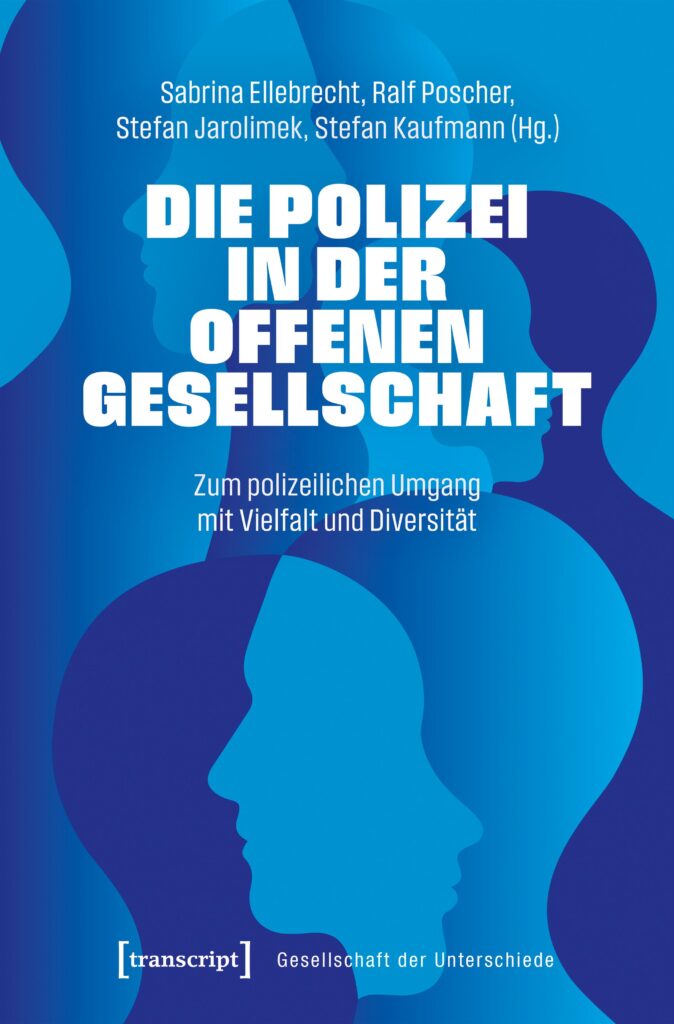The ‘ZuRecht’ research project publishes new research findings on diversity in the police force
Freiburg, 27/03/2025
An anthology from the research project “ZuRecht – – Die Polizei in der offenen Gesellschaft (The Police in an Open Society’) (2019-2024)”, led by the University of Freiburg, has been published.

What role do difference and diversity play for the police and their work? This question was the subject of the research project project “ZuRecht – – Die Polizei in der offenen Gesellschaft (The Police in an Open Society’) (2019-2024)”, which was funded by the Mercator Foundation. An interdisciplinary research team led by Dr Sabrina Ellebrecht and Prof. Dr Stefan Kaufmann of the Centre for Security and Society at the University of Freiburg, Prof. Dr Stefan Jarolimek of the German Police University in Münster and Prof. Dr Ralf Poscher of the Max Planck Institute for the Study of Crime, Security and Law in Freiburg worked together on this in seven sub-projects.
The publishing house transcript just released the anthology Die Polizei in der offenen Gesellschaft (The Police in an Open Society). It combines key research results, discussion points and reports from police practitioners. The result is not only an academic classification of current police work, but also a basis for reflection for police officers themselves, who deal with social pluralism in their work.
The results highlight the risks of discrimination and strategic inconsistencies in dealing with diversity
The articles examine the topic through the lens of law, sociology, politics and communications. A variety of research methods were used in the sub-projects: from legal dogmatic and statistical analyses to qualitative surveys and several months of ethnographic observation.
“In many areas, risks of unequal treatment and contradictions in the way diversity and difference are handled became apparent – praising diversity rarely leads to changes, neither in terms of selection criteria for the police force nor in terms of training content,” says Ellebrecht.
Empirical studies on personnel recruitment reveal, for example, that individual access hurdles disproportionately affect migrant applicants and that there is thus no equal access for this group of applicants, even though they are recruited separately. Evaluations of intercultural training and recruitment reveal significant differences in implementation and effectiveness, while critical analyses of the police’s public relations work show how narratives of origin are distorted or instrumentalised in public communication. Ethnographic research illustrates how the socialisation of a specific ‘police gaze’ takes place in training and everyday police work, and how the associated informal categorisation of people is functionally indispensable on the one hand, but at the same time is accompanied by problematic differentiations or discrimination. An analysis of “error culture” and “democratic resilience” emphasises the need for a change in organisational culture within the police force in order to actually recognise racial profiling or discrimination as such and to counteract it.

“What is important to remember is that diversity is not just about social skills; it is also about personal security. This becomes particularly clear when it comes to hate crimes and racially motivated offences.”
Dr Sabrina Ellebrecht
Centre for Security and Society, University of Freiburg
In a plural society, the police are faced with the challenge of interpreting their actions in such a way that legal rights apply to all and all are protected equally. “This may mean that the police have to make distinctions or take differences into account in order to do justice to everyone equally, for example when dealing with people who do not speak German or are deaf,” adds Ellebrecht. “What is important to remember is that diversity is not just about social skills; it is also about personal security. This becomes particularly clear when it comes to hate crimes and racially motivated offences.”
“In this respect,” adds co-director Kaufmann, “organisational diversity is linked to fairer and more effective policing and security policy.”
Close cooperation with the police
The researchers were in contact with several state police forces, the Federal Criminal Police Office and the federal police for the empirical studies and to discuss the results. “These opportunities for contact would not have been so diverse without the support of our project by the German University of Police,” says Ellebrecht. “Nevertheless, access to data and to the field was more or less complicated and productive in research practice.”
Further information can be found on the project homepage:
Anothology:
Sabrina Ellebrecht, Ralf Poscher, Stefan Jarolimek, Stefan Kaufmann (Hg.): Die Polizei in der offenen Gesellschaft, transcript Verlag, Bielefeld 2025:
About the editors
Dr Sabrina Ellebrecht is a sociologist and senior researcher at the Max Planck Institute for the Study of Crime, Security and Law. She is also a guest researcher at the Centre for Security and Society at the University of Freiburg, where she was responsible for the ‘ZuRecht’ project from 2019 to 2024. Her research interests are in the political sociology, security, police and discrimination research.
Prof. Dr Ralf Poscher has been Director of the Department of Public Law at the Max Planck Institute for the Study of Crime, Security and Law in Freiburg since 2019. His research focuses on constitutional and administrative law, particularly with regard to security law and legal theory.
Prof. Dr Stefan Jarolimek has been a professor of communication studies at the German Police University (DHPol) in Münster since 2015. He researches and publishes work about the professional field of communication in the police force, on strategic communication and extremism.
Prof. Dr Stefan Kaufmann is an adjunct professor at the Institute of Sociology at the University of Freiburg and research coordinator at the Centre for Security and Society. His research focuses on sociological security research, technology and organisational sociology.